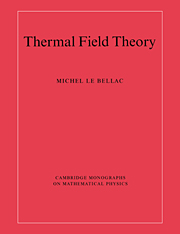Book contents
- Frontmatter
- Contents
- Preface
- 1 Introduction
- 2 Quantum statistical mechanics
- 3 The scalar field at finite temperature
- 4 Simple applications of perturbation theory
- 5 Dirac and gauge fields at finite temperature
- 6 Collective excitations in a plasma
- 7 Hard thermal loops and resummation
- 8 Dynamical screening
- 9 Neutrino emission from stars
- 10 Infrared problems at finite temperature
- A Formulary
- B Operator formalism
- References
- Index
2 - Quantum statistical mechanics
Published online by Cambridge University Press: 05 May 2010
- Frontmatter
- Contents
- Preface
- 1 Introduction
- 2 Quantum statistical mechanics
- 3 The scalar field at finite temperature
- 4 Simple applications of perturbation theory
- 5 Dirac and gauge fields at finite temperature
- 6 Collective excitations in a plasma
- 7 Hard thermal loops and resummation
- 8 Dynamical screening
- 9 Neutrino emission from stars
- 10 Infrared problems at finite temperature
- A Formulary
- B Operator formalism
- References
- Index
Summary
We now start what will be the subject of this book: quantum field theory at non-zero temperature and/or non-zero chemical potential. Two competing formalisms have been used at zero temperature in order to study field theory: the operator formalism, which is the older one, and the path integral formalism, which represents the more modern approach. Actually, it may often be illuminating to look at a given problem from both points of view, although in some cases one of the formalisms may prove to be definitely superior to the other: for example, path integrals are much simpler when quantizing gauge theories. At finite temperature, both formalisms are useful, and it is instructive to be able to switch from one approach to the other. Since the simplest case of field theory is field theory with zero space dimension, or, in other words, quantum mechanics, we shall begin with a short description of quantum mechanics at finite temperature, or, equivalently, quantum statistical mechanics. We first deal with the path integral approach, and later on revert to the more conventional operator formalism. We shall be particularly interested in time-ordered products of position operators, which will generalize to time-ordered products of field operators in field theory.
- Type
- Chapter
- Information
- Thermal Field Theory , pp. 18 - 34Publisher: Cambridge University PressPrint publication year: 1996

